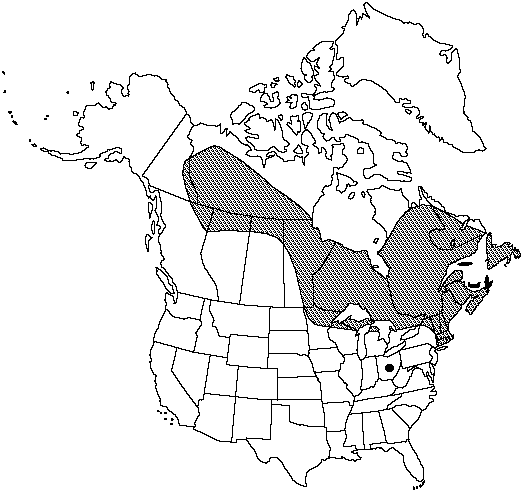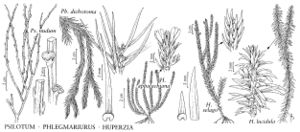Difference between revisions of "Huperzia selago"
Hort. Reg. Monac. 3. 1829.
FNA>Volume Importer |
GeoffLevin (talk | contribs) m (Added Bobbi Angell as illustrator) |
||
| (9 intermediate revisions by 3 users not shown) | |||
| Line 8: | Line 8: | ||
}} | }} | ||
|common_names=Northern fir-moss;huperzie sélagine | |common_names=Northern fir-moss;huperzie sélagine | ||
| − | |basionyms={{Treatment/ID/ | + | |special_status={{Treatment/ID/Special_status |
| + | |code=F | ||
| + | |label=Illustrated | ||
| + | }} | ||
| + | |basionyms={{Treatment/ID/Basionym | ||
|name=Lycopodium selago | |name=Lycopodium selago | ||
|authority=Linnaeus | |authority=Linnaeus | ||
| + | |rank=species | ||
| + | |publication_title=Sp. Pl. | ||
| + | |publication_place=2: 1102. 1753 | ||
}} | }} | ||
|synonyms={{Treatment/ID/Synonym | |synonyms={{Treatment/ID/Synonym | ||
|name=Plananthus selago | |name=Plananthus selago | ||
|authority=(Linnaeus) Palisot de Beauvois | |authority=(Linnaeus) Palisot de Beauvois | ||
| − | }}{{Treatment/ID/Synonym | + | |rank=species |
| + | }} {{Treatment/ID/Synonym | ||
|name=Urostachys selago | |name=Urostachys selago | ||
|authority=(Linnaeus) Herter | |authority=(Linnaeus) Herter | ||
| + | |rank=species | ||
}} | }} | ||
|hierarchy=Lycopodiaceae;Huperzia;Huperzia selago | |hierarchy=Lycopodiaceae;Huperzia;Huperzia selago | ||
| Line 26: | Line 35: | ||
}}<!-- | }}<!-- | ||
| − | --><span class="statement" id="st- | + | --><span class="statement" id="st-undefined" data-properties=""><b>Shoots </b>erect, indeterminate, 8–12 cm, becoming short-decumbent; leaves of mature portion slightly smaller than leaves of juvenile portion (more pronounced in sun form); indistinct annual constrictions present (more pronounced in shade form); juvenile growth erect. <b>Leaves</b> spreading-ascending (shade) to appressed-ascending (sun) in mature portion, more reflexed in juvenile portion, green (shade) to yellow-green (sun), lustrous; largest leaves triangular, widest at base, 4–7.5 mm; smallest leaves lanceolate, 3.5–5 mm; margins almost entire, papillate; stomates on both surfaces, numerous on adaxial surface, 30–90 per 1/2 leaf. <b>Gemmiferous</b> branchlets produced in 1 pseudowhorl at end of annual growth; gemmae 4–5 × 3–4.5 mm, lateral leaves 1.5–2 mm wide, broadly acute. <b>Spores</b> 29–37 µm. <b>2n</b> = 268.</span><!-- |
-->{{Treatment/Body | -->{{Treatment/Body | ||
|habitat=Terrestrial in sandy borrow pits, ditches, lakeshore swales, and conifer swamps, rarely on acidic, igneous rock or calcareous coast cliffs | |habitat=Terrestrial in sandy borrow pits, ditches, lakeshore swales, and conifer swamps, rarely on acidic, igneous rock or calcareous coast cliffs | ||
|elevation=0–700 m, rarely to 1600 m | |elevation=0–700 m, rarely to 1600 m | ||
| − | |distribution=St. Pierre and Miquelon;Alta.;B.C.;Man.;N.B.;Nfld.;N.W.T.;N.S.;Ont.;P.E.I.;Que.;Sask.;Yukon;Conn.;Maine;Mass.;Mich.;Minn.;N.H.;N.Y.;Ohio;R.I.;Vt.;Wis.;Europe;Asia. | + | |distribution=St. Pierre and Miquelon;Alta.;B.C.;Man.;N.B.;Nfld. and Labr. (Nfld.);N.W.T.;N.S.;Nunavut;Ont.;P.E.I.;Que.;Sask.;Yukon;Conn.;Maine;Mass.;Mich.;Minn.;N.H.;N.Y.;Ohio;R.I.;Vt.;Wis.;Europe;Asia. |
| − | |discussion=<p>Plants from Greenland formerly identified as Huperzia selago are H. appalachiana.</p> | + | |discussion=<p>Plants from Greenland formerly identified as <i>Huperzia selago</i> are <i>H. appalachiana</i>.</p> |
|tables= | |tables= | ||
|references= | |references= | ||
| Line 41: | Line 50: | ||
-->{{#Taxon: | -->{{#Taxon: | ||
name=Huperzia selago | name=Huperzia selago | ||
| − | |||
|authority=(Linnaeus) Bernhardi ex Schrank & Martius | |authority=(Linnaeus) Bernhardi ex Schrank & Martius | ||
|rank=species | |rank=species | ||
| Line 48: | Line 56: | ||
|basionyms=Lycopodium selago | |basionyms=Lycopodium selago | ||
|family=Lycopodiaceae | |family=Lycopodiaceae | ||
| + | |Illustrator=Bobbi Angell | ||
|habitat=Terrestrial in sandy borrow pits, ditches, lakeshore swales, and conifer swamps, rarely on acidic, igneous rock or calcareous coast cliffs | |habitat=Terrestrial in sandy borrow pits, ditches, lakeshore swales, and conifer swamps, rarely on acidic, igneous rock or calcareous coast cliffs | ||
|elevation=0–700 m, rarely to 1600 m | |elevation=0–700 m, rarely to 1600 m | ||
| − | |distribution=St. Pierre and Miquelon;Alta.;B.C.;Man.;N.B.;Nfld.;N.W.T.;N.S.;Ont.;P.E.I.;Que.;Sask.;Yukon;Conn.;Maine;Mass.;Mich.;Minn.;N.H.;N.Y.;Ohio;R.I.;Vt.;Wis.;Europe;Asia. | + | |distribution=St. Pierre and Miquelon;Alta.;B.C.;Man.;N.B.;Nfld. and Labr. (Nfld.);N.W.T.;N.S.;Nunavut;Ont.;P.E.I.;Que.;Sask.;Yukon;Conn.;Maine;Mass.;Mich.;Minn.;N.H.;N.Y.;Ohio;R.I.;Vt.;Wis.;Europe;Asia. |
|reference=None | |reference=None | ||
|publication title=Hort. Reg. Monac. | |publication title=Hort. Reg. Monac. | ||
|publication year=1829 | |publication year=1829 | ||
| − | |special status= | + | |special status=Illustrated |
| − | |source xml=https:// | + | |source xml=https://bitbucket.org/aafc-mbb/fna-data-curation/src/2e0870ddd59836b60bcf96646a41e87ea5a5943a/coarse_grained_fna_xml/V2/V2_3.xml |
|genus=Huperzia | |genus=Huperzia | ||
|species=Huperzia selago | |species=Huperzia selago | ||
| − | |||
| − | |||
| − | |||
| − | |||
| − | |||
| − | |||
| − | |||
| − | |||
| − | |||
| − | |||
| − | |||
| − | |||
| − | |||
| − | |||
| − | |||
| − | |||
| − | |||
| − | |||
| − | |||
| − | |||
| − | |||
| − | |||
| − | |||
| − | |||
| − | |||
| − | |||
| − | |||
| − | |||
| − | |||
| − | |||
| − | |||
| − | |||
| − | |||
}}<!-- | }}<!-- | ||
-->[[Category:Treatment]][[Category:Huperzia]] | -->[[Category:Treatment]][[Category:Huperzia]] | ||
Latest revision as of 19:29, 18 May 2022
Shoots erect, indeterminate, 8–12 cm, becoming short-decumbent; leaves of mature portion slightly smaller than leaves of juvenile portion (more pronounced in sun form); indistinct annual constrictions present (more pronounced in shade form); juvenile growth erect. Leaves spreading-ascending (shade) to appressed-ascending (sun) in mature portion, more reflexed in juvenile portion, green (shade) to yellow-green (sun), lustrous; largest leaves triangular, widest at base, 4–7.5 mm; smallest leaves lanceolate, 3.5–5 mm; margins almost entire, papillate; stomates on both surfaces, numerous on adaxial surface, 30–90 per 1/2 leaf. Gemmiferous branchlets produced in 1 pseudowhorl at end of annual growth; gemmae 4–5 × 3–4.5 mm, lateral leaves 1.5–2 mm wide, broadly acute. Spores 29–37 µm. 2n = 268.
Habitat: Terrestrial in sandy borrow pits, ditches, lakeshore swales, and conifer swamps, rarely on acidic, igneous rock or calcareous coast cliffs
Elevation: 0–700 m, rarely to 1600 m
Distribution

St. Pierre and Miquelon, Alta., B.C., Man., N.B., Nfld. and Labr. (Nfld.), N.W.T., N.S., Nunavut, Ont., P.E.I., Que., Sask., Yukon, Conn., Maine, Mass., Mich., Minn., N.H., N.Y., Ohio, R.I., Vt., Wis., Europe, Asia.
Discussion
Plants from Greenland formerly identified as Huperzia selago are H. appalachiana.
Selected References
None.
